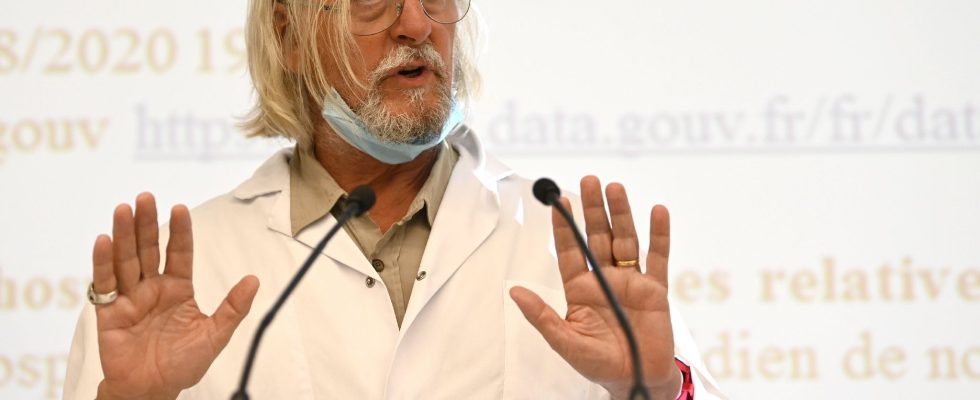The French Cancer Society, that of pharmacology, cardiology, or even resuscitation… A rarity in the hushed world of scientific institutions, no less than 16 learned societies have signed on their behalf a grandstand at World, this Sunday, May 28, against a character once considered a spawn of French microbiology, who became a rock star during the Covid-19 pandemic and today accused of fraud: Didier Raoult. L’Express takes stock of what it is accused of, and the fears of the world of the scientific world.
What do the authors of the forum denounce?
The signatory institutions criticize the teams of the Institut hospitalier universitaire (IHU) Méditerranée Infection led by Didier Raoult “the systematic prescription, to patients with Covid-19 […] drugs as varied as hydroxychloroquine, zinc, ivermectin or azithromycin […] without solid pharmacological bases, and in the absence of any proof of efficacy”.
A practice that is similar to a wild clinical trial, according to the 16 learned societies. “The largest known to date”, they denounce, while these prescriptions were used for the publication, last March, of an unreviewed research article relating to 30,000 Covid-19 patients. “We believe that these systematic prescriptions were also carried out outside any marketing authorization, but also outside any ethical or legal framework”, indicate the signatories.
Why are they calling for sanctions?
Beyond the fact that it would not have been declared, the study would also contravene the scientific foundations, according to the learned societies. These prescriptions were continued “for more than a year after the formal demonstration of their ineffectiveness”, they write. The authorities must therefore take “measures adapted to the faults committed”, in the name of “patient safety” and “the credibility of French medical research”, they conclude.
Scientific institutions want to prevent such abuses from happening again and erode confidence in science, which is already regularly attacked by various currents of thought. “In the absence of a reaction from the institutions, the serious shortcomings observed could become the norm”, explain the authors of the forum. Hydroxychloroquine is a molecule that exposes patients to potential adverse effects, some of which can be serious, recalled the Medicines Agency last April. According to some studies, its use during the health crisis would even have contributed to worsening the state of health of patients, because of the heart problems that can be generated by this product.
Why do the media also take it for their rank?
At the start of the health crisis, many media gave the floor to Didier Raoult “without critical hindsight, in a favorable light”, denounce the signatories. “The mediatization […] has largely contributed to fueling the mistrust of some of our fellow citizens towards science, clinical research, health authorities and experts in general”, they believe. And to add: “in the particularly anxiety-provoking context of this health crisis, the peremptory statements proclaiming the effectiveness of these treatments have, unfortunately, met with great success in the public.
Is Didier Raoult prosecuted by French justice?
The Marseille public prosecutor’s office had opened a judicial investigation in July 2022, after a scathing report from the ANSM, for “forgery in writing”, “use of forgery in writing” and “interventional research involving a human person not justified by his taking into account. usual charge”, before the publication of Didier Raoult’s wild clinical trial. At this stage, there has been no indictment, the prosecution told AFP at the end of May.
After a damning inspection report (Igas / IGESR) on the medical, scientific and managerial excesses of the IHU under the leadership of Didier Raoult, the government also announced on September 5 to take legal action. On this aspect, the Marseille prosecutor’s office is still in the analysis phase, he told AFP. Questioned this Sunday during the RTL / LCI / Le Figaro Grand Jury, the Minister of Health François Braun indicated that the investigation also related to the new “wild” clinical trial and that it was not over.
Does Didier Raoult continue to exercise?
Retired since the summer of 2021 from his post as university professor-hospital practitioner, Didier Raoult was replaced at the end of August 2022 at the head of the IHU Méditerranée by Pierre-Edouard Fournier. Professor Raoult, who comes to the IHU “from time to time”, is now professor emeritus and supervises two theses that began before his departure, according to a spokesperson for the institution. Within the IHU, all clinical trials involving humans have been suspended since the arrival of Professor Fournier.
The institute told AFP to wait for a forthcoming return from the ANSM on this subject. On the ANSM side, “the next step is the follow-up, and potentially the lifting of the injunctions made to the IHU, as on clinical trials. The IHU must demonstrate that they have met expectations”, declared a door – word of the drug agency, without giving a time horizon.
